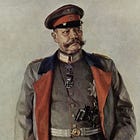"... is like a man without character"
Eine Fussnotenfahrt
This post continues the story begun in “An attack without a Schwerpunkt” …
The Hathi Trust search engine found but one instance of the phrase “Angriff ohne Schwerpunkt.” This, however, had taken up residence within the longer version of the quotation. (“Ein Angriff ohne Schwerpunkt; ist wie ein Mann ohne Charakter, der alles dem Zufall überläßt.”) Better yet, the author of the work in question, a monograph on the subject of the German attack at Gorlice in 1915, associated the maxim with a particular point in the life of Field Marshal Hindenburg.1 Best of all, he explained the specifics of the situation that led Hindenburg coin his catchphrase.
In the absence of sufficient artillery to cover the entire front, it was the duty of the leaders within each sector to choose break-in positions [Einbruchstellen] where the employment [Einsatz] of the available means of attack would prepare the decisive attack of the infantry. Thus was formed the main-effort tactics [Schwerpunkttaktik], for which Field Marshal von Hindenburg coined the phrase “An attack without a Schwerpunkt is like a man without character, who leaves everything to chance.”2
Subsequent searches on the websites of German digital libraries (such as the Munich Digital Center and the Digital City Library of Berlin) turned up no instances of the use of “Ein Angriff ohne Schwerpunkt …” A search on the more specialized website of the Upper Austria State Library gave me the same result as the Hathi Trust.
So, with these things in mind, I offer two propositions.
Though the German Army of the interwar period produced a great deal of literature, what has been preserved in print was but the tip of the iceberg of a largely spoken culture.
Much of the impetus behind the spread of “ein Angriff ohne Schwerpunkt …” within this spoken culture came from Hans von Seeckt. (In 1915, Seeckt served as chief-of-staff of the German Eleventh Army, which formed the Schwerpunkt of the Austro-German army group that conducted the offensive at Gorlice. Between 1920 and 1926, he served as chief of staff of the army of the Weimar Republic.)
Marvelous to say, as I conducted this search in the manner of the present century, a used-to-be-a-tree copy of this monograph sat patiently on one of my bookshelves, keeping silent company with other volumes of the Battles of the World War [Schlachten des Weltkrieges] series.
Oskar Tile von Kalm Gorlice (Oldenburg: Gerhard Stalling, 1930) pages 192 and 193







"what has been preserved in print was but the tip of the iceberg of a largely spoken culture."
This was the exact conclusion I came to when researching the German use of "operativ"—it was so much a spoken culture that Freytag-Loringhoven felt compelled to explain the shift in the usage of the word "strategy" by the General Staff.
Interesting that in both cases, German officers were responding to Clausewitz' abstractions: by redefining them (in the case of Schwerpunkt) or by inventing a new term to replace one that he himself had redefined ("operativ" instead of "strategy").